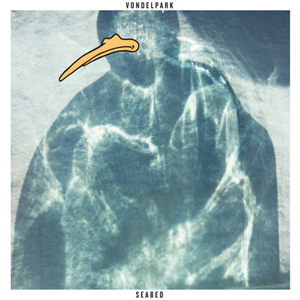Vondelpark Seabed
A draft of “California Analog Dream,” the lead single from Vondelpark‘s debut full-length, also appeared […]

A draft of “California Analog Dream,” the lead single from Vondelpark‘s debut full-length, also appeared on the trio’s first EP for R&S, Sauna. The updated version showcases the strengths the UK group has honed since it rose from the ashes of the band Lion Club in 2010. The flimsy 2-step rhythm that rattled around in a haze of muddy guitar licks and nasally vocals on the original feels more solid on the rework, and it’s now closer to a rock beat than shuffling garage. Lewis Rainsbury, Alex Bailey, and Matt Law are no longer hiding behind layers of distortion in an attempt to mask the singing or polished instrumentation like teenagers eclipsing their faces behind shaggy hair. The band has matured, and on Seabed, the group presents a distinct voice and cohesive vision that’s less hesitant and more vibrant than the one presented on its previous releases.
In broad strokes, the album is more robust, sexier, and moodier than Vondelpark’s past efforts. It’s a confident attempt to stake out a distinguishable sound within the web of influences and like-minded contemporaries the band has been linked to, including stalwarts like New Order and Radiohead, as well as newer faces like James Blake and The xx. As we mentioned when we premiered the video for “Camels” a few years ago, Boomkat listed the group under the tag “emo garage,” a term that could unite Vondelpark with other musicians who have blended singer-songwriter structures with broken beats and rumbling layers of sub bass; this includes members of the R&S/Apollo family such as Airhead and Gacha, as well as indie crossover artists in the mold of Raleigh Moncrief. While the trio toys with familiar elements like slowly swaggering beats and wispy vocals, Seabed establishes a recognizable voice by drawing on a nautical motif throughout the course of its 10 tracks.
For example, there’s “Dracula,” a full-bodied number which bobs along on voluptuous bass tones and a sturdy, lulling beat, creating an aquatic ebb and flow that Vondelpark sustains throughout the record. “Quest” rolls out a gentle, rocking rhythm with claps that sound like waves crashing onto a shore, while the prickly opening notes of “Blue Again” seem to bubble up from the depths of silence. These songs are hazy and drenched in reverb, but instead of sounding muffled or muddy, they’re clear and crisp, making tracks like “Come On” feel fluid. Guitars echo and synths hoot, pulsing and fluttering like swimming jellyfish.
The only element that isn’t always so clear and defined is the vocal delivery; as such, it tends to stick out and occasionally take the listener out of the music’s smooth atmosphere. Although Rainsbury’s voice sounds familiar—at different moments, he effects a croon like James Blake or Thom Yorke, while at others he guns for a deeper and more brooding tone akin to The xx’s Oliver Sims—it’s often hard to make out what exactly he’s saying. On “Always Forever,” only a few words are enunciated, like “truth” and the repeated hook, “I’m just saying that I’m having a time/You’re just saying that you’re having the time of your life.” Even though Rainsbury’s vocals are no longer smothered by a fog of distortion, there are stretches of ambiguous lyrics, which can be a bit distracting from the rich, seductive, and immersive mood that persists throughout Seabed.

